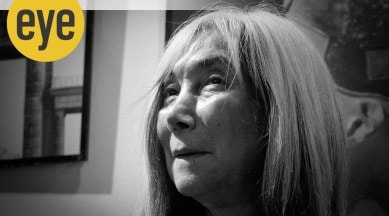The controversial legacy of María Kodama, wife of Argentine writer Jorge Luis Borges
Kodama, who lived in Buenos Aires, was known for her fierce gatekeeping of the translation and publication rights of Borges' works

In 1953, eight years before he shared one of France’s most prestigious literary award, the Formentor Prize, with Irish playwright Samuel Beckett, and less than a decade before he shot to international fame with English translations of his Spanish magic-realist fictions about dreams and infinity, Argentine writer Jorge Luis Borges, then 53, ran into María Kodama, a 16-year-old fan, in a Buenos Aires bookstore. He invited her to a lecture he was delivering and that would be the beginning of a relationship in which Kodama would come to mean many things for the writer: student, friend, assistant, traveling aide, collaborator, inheritor of his estate, and eventually, wife. Kodama died on March 26 in her Buenos Aires home at the age of 86, reportedly of breast cancer. She left behind a controversial legacy of both adoring her husband’s literature and fiercely gatekeeping its translation and publication rights, to the frequent umbrage of scholars.
Soon after her husband’s death in 1986, Koama established the Jorge Luis Borges International Foundation — her platform for promoting his work — whose status is currently unknown because she didn’t leave behind a will.
monthly limit of free stories.
with an Express account.
Kodama was born on March 10, 1937, in Buenos Aires to a Japanese father and an Argentine German mother. The couple separated when she was three and Kodama grew up in the house of her mother’s family, spending weekends with her father who imbued in her an appreciation for art. She studied literature in university and published three books later in life, Relatos (2020), a short fiction collection, Homage to Borges (2016), a collection of lectures she had delivered about the author, and Atlas (1984), a travelogue written by Borges and photographed by her, detailing trips they took to the Americas, Europe, Egypt, Turkey, Iceland and Japan.
After Borges’s death, notorious feuds sprang between his collaborators and her. She allowed his works’ most popular English translations — by translator Norman Thomas di Giovanni, written in collaboration with Borges — to go out of print. Subsequent translations by Andrew Hurley have had mixed reception. She legally compelled Jean-Pierre Bernes, a French editor, to hand over recordings of his discussions with Borges about annotations for translations. Those notes are currently unpublished. She has sued younger writers who have adapted Borges with charges of plagiarism and appropriation. Journalist Pierre Assouline, in 2006, described her as “an obstacle to the dissemination of the works of Borges.”
In a 2016 interview to The Sydney Review of Books, Kodama fired back at her critics: “I have been treated like the wicked witch for defending my husband’s legacy… I gave Borges my word that I would take care of his work. I have been through 30 years of hell. I have been defamed.”
When asked why she kept at it regardless, she said, “This has been my job for 30 years. You only give your life to something if you love it madly. If I didn’t love him madly, I wouldn’t do it.”